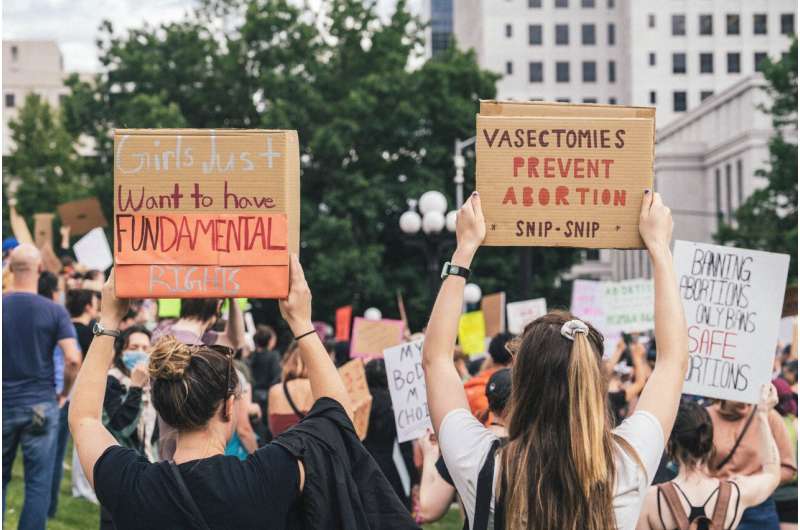Support for abortion went up after Roe v. Wade was overturned, report says

Support for abortion rights in the United States increased following the Supreme Court's June decision to overturn Roe v. Wade, according to a new report.
Moreover, support for abortion increased more in the 13 states with "trigger laws"—legislation that was designed to ban or limit abortion access immediately following the ruling—than in other states.
Researchers say this represents a chasm between the high court's decision and public opinion in the United States, where a majority opposed the overturning of Roe v. Wade, and that this may impact the outcomes of the 2022 midterm elections.
In the majority opinion of Dobbs v. Jackson Women's Health Organization, the ruling that overturned Roe, Justice Samuel Alito wrote, "Roe and Casey have enflamed debate and deepened division. It is time to heed the Constitution and return the issue of abortion to the people's elected representatives."
But Alauna Safarpour, a visiting postdoctoral fellow at Northeastern's Network Science Institute and co-author of the report, says that so far, the decision has not had its intended effect.
"There's an inherent disconnect between Justice Alito's opinion suggesting that turning the issue of abortion back over to the states would increase the coherence with public opinion and state policies, and what we actually see, which is that that's not what occurs," she says.
The report was released as part of the COVID States Project, which collects and releases data on COVID-19 trends but has moved to "other interesting societal questions," says David Lazer, a university distinguished professor of political science and computer sciences at Northeastern and a principal investigator on the project. The project is led by a consortium of scholars from Northeastern, Harvard University, Rutgers University and Northwestern University.
In a survey of 24,414 across all 50 states and the District of Columbia before and after the Dobbs decision, researchers asked respondents about their level of support for nine different scenarios involving abortion, ranging from "A women does not want to be pregnant," to "After six weeks of pregnancy," to "Staying pregnant could cause the woman to die." They found that between 1% and 5% of respondents increased their support for abortion, depending on the scenario.
In the 13 states where "trigger laws" went into effect after Roe was overturned, however, this range was 3% to 9%. "Public opinion moved in the opposing direction as public policy," the report states, despite the court's claim in their opinion that "It is time to heed the Constitution and return the issue of abortion to the people's elected representatives," and that the abortion issue would be resolved through voting.
In regard to whether this will affect the outcome of the midterm elections, Lazer says, "this report hints that there might be some shift."
Men, rural residents and respondents with a high school education or less are less likely to vote in the midterms after the Dobbs decision, the report found. Safarpour notes that the latter two groups form a core Republican constituency, and this may indicate that a "win" on the abortion issue demotivates them to vote. In the overall population, there was not a significant change in plans to vote post-Dobbs.
The report found that those who are "very likely" to vote are more likely to support abortion, while support for abortion increased for those who are not "very likely" to vote. There was very little change in party preference before and after the decision.
Respondents also generally supported more of the nine scenarios after the Dobbs decision, suggesting that those who support abortion became more set in their views following the decision.
"If there's a major change such as the Dobbs decision or a state-level policy change, that's going to shift that group of people who are more on the fence towards a certain direction," says Krissy Lunz Trujillo, a postdoctoral fellow at Northeastern's Network Science Institute and co-author of the report.
Abortion is far from being the only political arena where public opinion and the law diverge. Climate change, health care issues and gun control are all examples of this, the team says.
But psychologically, the abortion issue is unique in that Americans have experienced a loss of a liberty through the Dobbs decision. "There's something about the politics of loss, of losing something that you had," Lazer says. "Something was taken away, and I think that may be especially activating politically."
According to Safarpour, it makes sense that the court's decision would inspire people to vote. "[It came] as a surprise, and I think it makes people angry, and we've seen in a lot of the political science literature that anger is very motivating."
Provided by Northeastern University




















